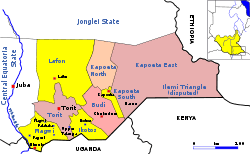The conflicting communities of Omorwo and Ohilai of Bur payam in Torit County of South Sudan’s Eastern Equatoria state on Wednesday resolved to mend relations by compensating those killed, returning stolen livestock, and ensuring free movement in the area.
The recent resolutions were agreed upon during their first pre-peace dialogue organized by Torit County in collaboration with the African Inland Church which brought together representatives from the two villages.
Last December, conflict erupted between the two communities over persistent revenge attacks that claimed nearly 10 lives from both sides, led to the displacement of families from Omorwo village, and the return of raided property and livestock.
The displaced families, who sought refuge at the commissioner’s office, have insisted they will only return to their homes when the situation is resolved.
Jacob Attari Albano, Commissioner of Torit County told Radio Tamazuj on Thursday that the meeting was successful.
“They have agreed to allow the free movement of those who come from there to Torit and go back. The Ohilai committed to pay back the stolen properties which they have raided from Omorwo and also including those who were killed from both sides should also be compensated,” he pointed out.
A youth leader from Omorwo village, Obiala Michael, confirmed the resolutions and said his community will implement them to avoid a return to war saying the conflict has caused a lot of harm to the people.
“The dialogue went well. We agreed on many things and we are going to tell our people in the villages to open the roads, the goats should be returned,” he said. “This conflict has negatively impacted our communities, children are sick with hunger disturbing us a lot.”
For his part, Dominic Ohure Oreste, a representative of the Ohilai community emphasized the need to arrest perpetrators who incite conflict among communities.
“We have accepted peace. We accept dialogue and accept peace we should go back to our normal life. Omorwo have agreed to open the roads, and we also agreed to the same,” he said. “If a criminal kills someone from Ohilai, that person should be brought to the government to face justice. We should not be condemned for the crimes of an individual.”



